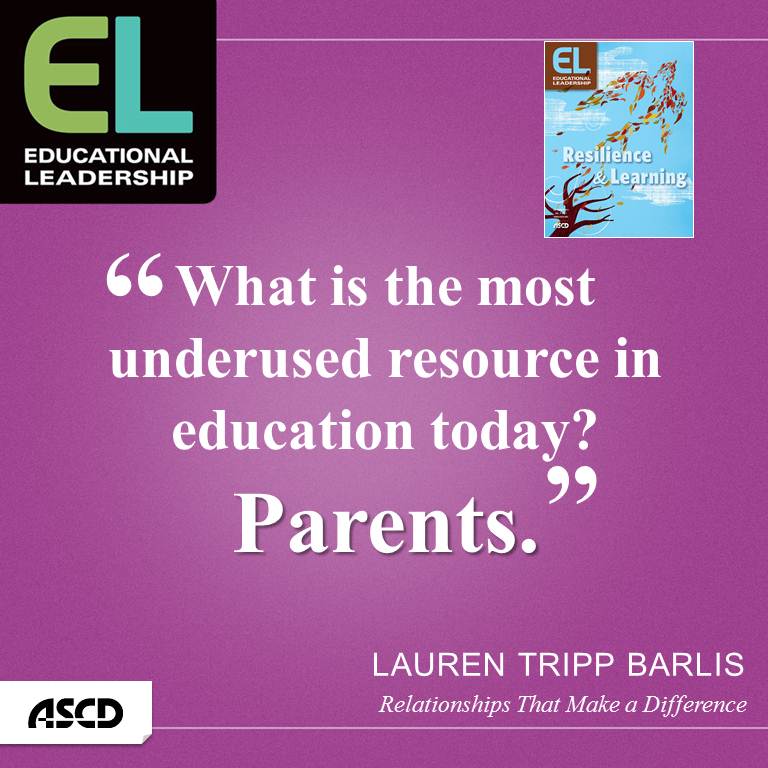Lauren Tripp Barlis, a coordinator in the Office of Student Learning at Step Up for Students in Tampa, Fla., shares insights related to her article, “Relationships That Make a Difference,” in the September 2013 issue of Educational Leadership.
What is the most underused resource in education today? This resource can increase student engagement and achievement and decrease a teacher’s workload. The answer? Parents. Parental involvement is clearly linked with academic success for all students, regardless of income level (Hughes & Kwok, 2007; Ingram, Wolfe, & Lieberman, 2007; Knopf & Swick, 2007).
In my Educational Leadership article, I discussed how teachers and administrators can help marginalized students succeed. Another factor that was crucial to the success of the black male first-generation students who participated in my study was parental support. Their parents placed a high value on education. Although the parents rarely visited the school or communicated with their children’s teachers, they demonstrated their involvement with firm discipline and by encouraging their children to talk to the teacher if they struggled with an assignment.
One student, Marcus, said that when he was young his mother (who had a high school education) created enrichment activities to help him practice the alphabet or counting skills at home, but she often did not understand his school assignments as he grew older. Instead of communicating with his teachers about the assignments, she advised him to ask his teachers for help. This type of parental involvement was crucial to Marcus’s development of personal relationships with his teachers, which was a key factor in his academic success.
Low-income or nonwhite populations are often perceived as uninvolved in their children’s education because they may focus on the nonschool elements of parental involvement (expectations, interest, and parent-child communication) instead of participating in traditional ways, such as volunteering or attending school events (Nieto, 1987).
So how can teachers tap into that underused resource of parent partnerships, especially with parents who may be hesitant to connect with them? In my current position with Step Up for Students (SUFS), I assist schools and families in establishing and maintaining collaborative partnerships. One of the ways we do this is through a web-based application called the Learning Compact. Teachers use the tool to create an individual compact for each student that includes which Common Core State Standards students are expected to learn over the course of the school year; a collaborative framework for the parent and teacher to identify the student’s assets, weaknesses, and expectations; and strategies and interventions parents and teachers can use to address a student’s needs. The tool also provides resources, such as math instructional videos through Khan Academy, Common Core–linked lesson plans, and instructional videos in English language arts. And, because it is an online resource, parents can access the tool from home and see instant updates from their children’s teachers on their progress and what they can do to help.
By discovering different ways to reach out to parents, school leaders can create the kinds of strong partnerships that all students need.
References
Hughes, J., & Kwok, O. (2007). Influence of student-teacher and parent-teacher relationships on lower achieving readers’ engagement and achievement in primary grades. Journal of Educational Psychology, 99, 39–51.
Ingram, M., Wolfe, R. B., & Lieberman, J. M. (2007). The role of parents in high-achieving schools serving low-income, at-risk populations. Education and Urban Society, 39(4), 479–497.
Knopf, H. T., & Swick, K. J. (2007). How parents feel about their child’s teacher/school: Implications for early childhood professionals. Early Childhood Education Journal, 34, 291–296.
Nieto, S. (1987). Parent involvement in bilingual education: Whose responsibility is it? NABE Journal, 11, 189–201.








